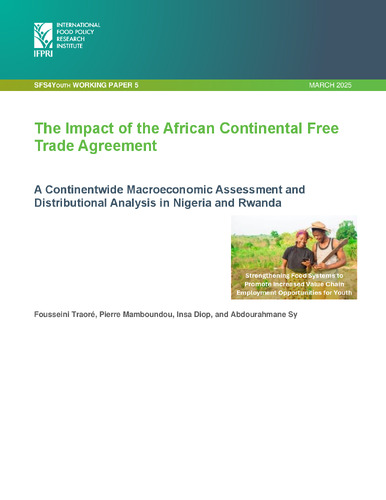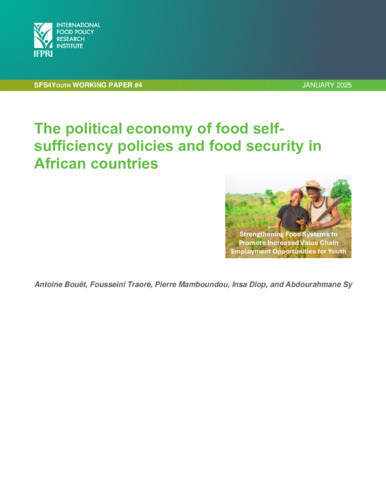The impact of the African continental Free Trade Agreement: A continentwide macroeconomic assessment and distributional analysis in Nigeria and Rwanda
Africa remains the least open continent in the world, with high trade restrictions for both intra- and extra-African partners. These restrictions include both tariff and nontariff measures, as well as high transportation costs due to poor infrastructure. However, previous studies have highlighted the crucial role of intra-regional trade in boosting national economies, promoting development, and enhancing food security by increasing the availability of food and stabilizing domestic markets. In particular, informal cross-border trade, which is pervasive in Africa, contributes to food security, although further research is needed on its magnitude.
This research aims to enhance the understanding of current and future trends in Africa’s food systems, focusing on continental) trade and its impact on national economies and markets. Its objective is to assess the impact of the African Continental Free Trade Agreement (AfCFTA), the most ambitious regional trade agreement in Africa, on national economies and markets. The study uses state-of-the-art tools, includes informal cross-border trade of agricultural products, and considers realistic scenarios of trade liberalization.
The study finds that the AfCFTA’s impact will be positive, although limited. Because most African countries are already trading under preferential regimes within regional economic communities (RECs), AfCFTA primarily affects trade flows outside of these communities. We observe traditional trade diversion effects from partners outside of Africa (up to −1.68 percent) and trade creation within the continent (up to 18.48 percent). Like the agreement’s macroeconomic impacts on gross domestic product growth and trade, its effects on poverty are also limited, with more positive effects in Rwanda than in Nigeria, the two countries analyzed in the microsimulation. A gender bias is present in the results: Female-headed house-holds benefit less from the agreement than male-headed households. Given the continent’s high trans-portation costs, significant gains can occur by reducing transport margins in addition to implementing the AfCFTA. In that case, the positive results are amplified, while the negative effects are dampened.
Because AfCFTA implementation is still in early stages, more information is needed to fine-tune the results. First, it is important to examine the assumptions behind the selection of sensitive and excluded products. In the absence of official lists, which are not available for most countries, the final lists may differ from the selection made in this report, although the method we use has proven to be effective for past agreements. In addition, rules of origin and other nontariff measures will play a significant role in the future of the agreement, affecting the results and likely changing the distribution of gains and losses.
Authors
Traoré, Fousseini; Mamboundou, Pierre; Diop, Insa; Sy, Abdourahmane
Citation
Traoré, Fousseini; Mamboundou, Pierre; Diop, Insa; and Sy, Abdourahmane. 2025. The impact of the African continental Free Trade Agreement: A continentwide macroeconomic assessment and distributional analysis in Nigeria and Rwanda. SFS4Youth Working Paper 5. Washington, DC: International Food Policy Research Institute. https://hdl.handle.net/10568/173844
Country/Region
Nigeria; Rwanda
Keywords
Africa; Sub-saharan Africa; Eastern Africa; Western Africa; Food Systems; Tariffs; Macroeconomics; Trade; Trade Agreements; Free Trade Agreements
Access/Licence
Open Access







